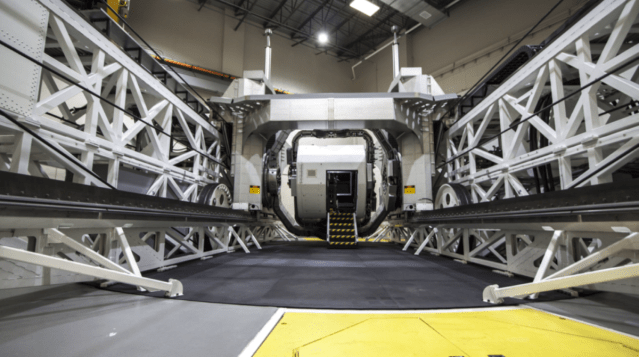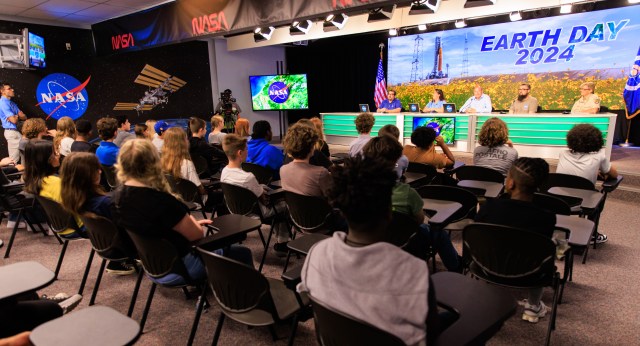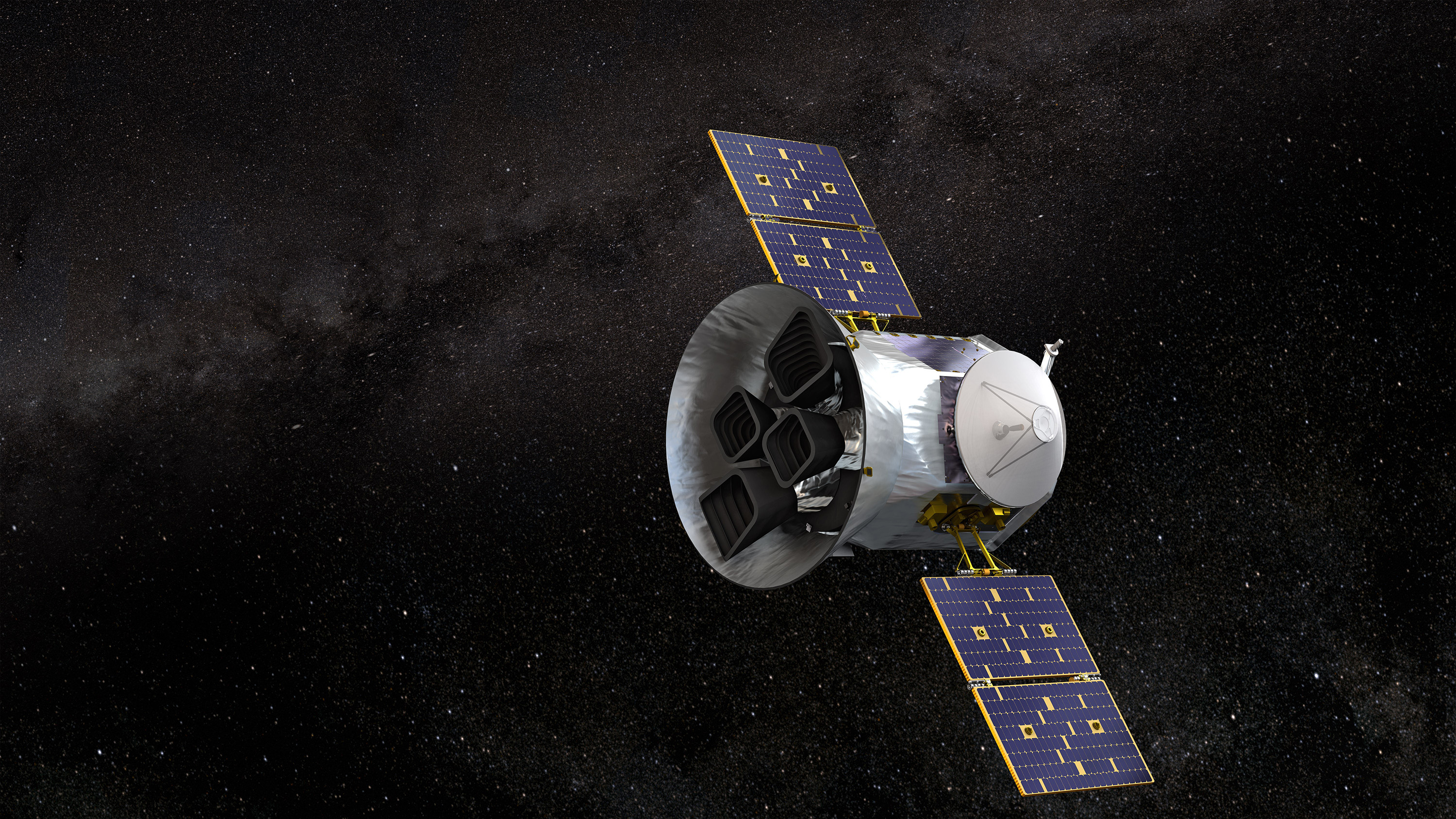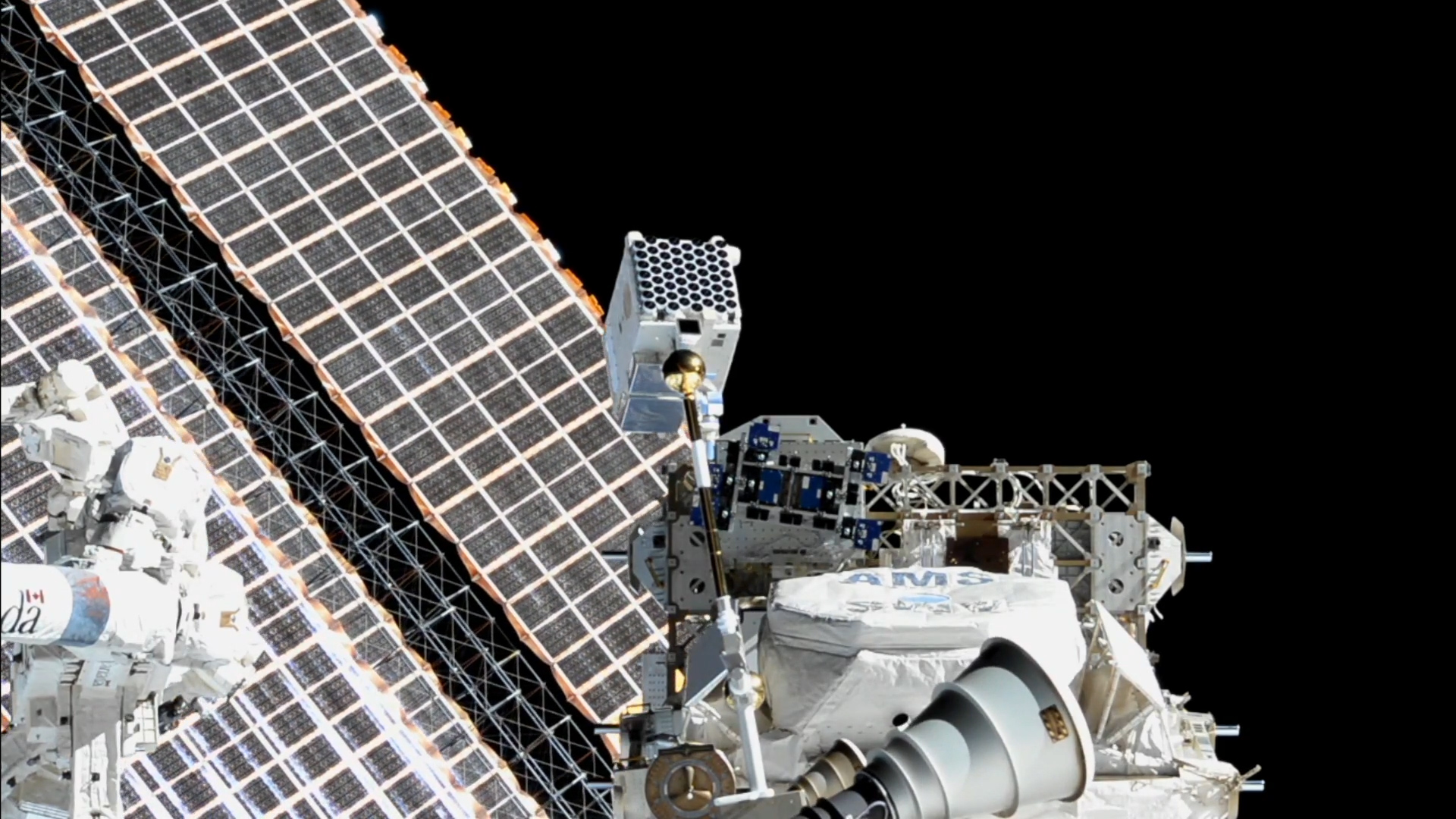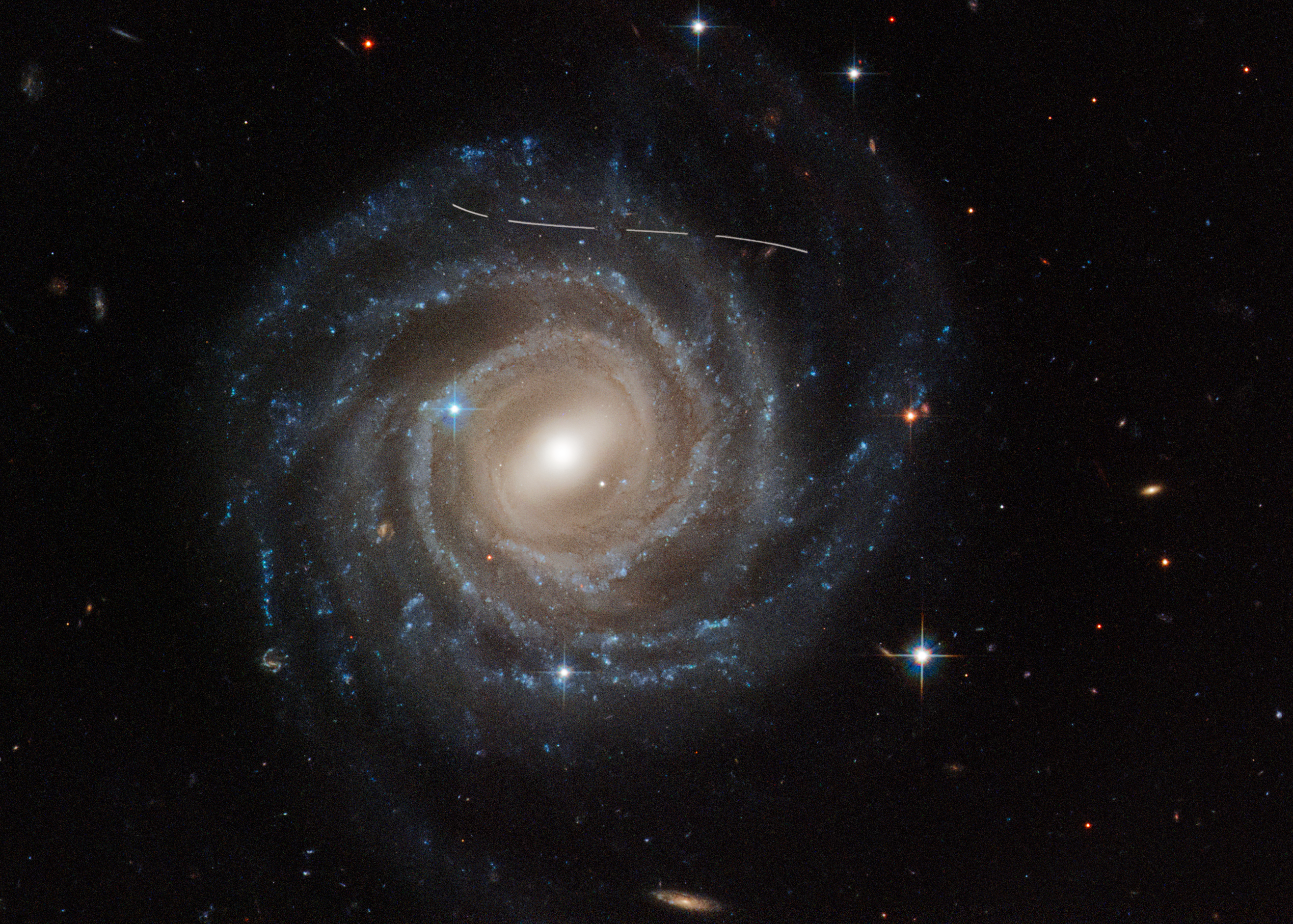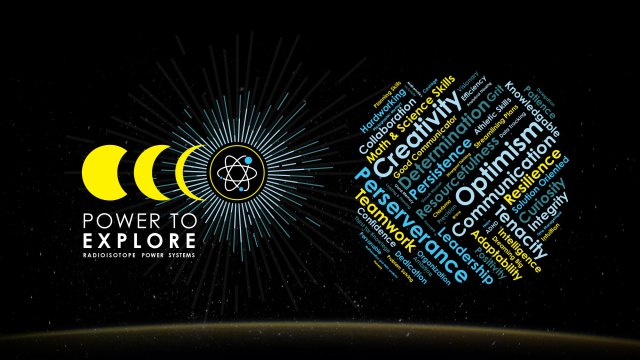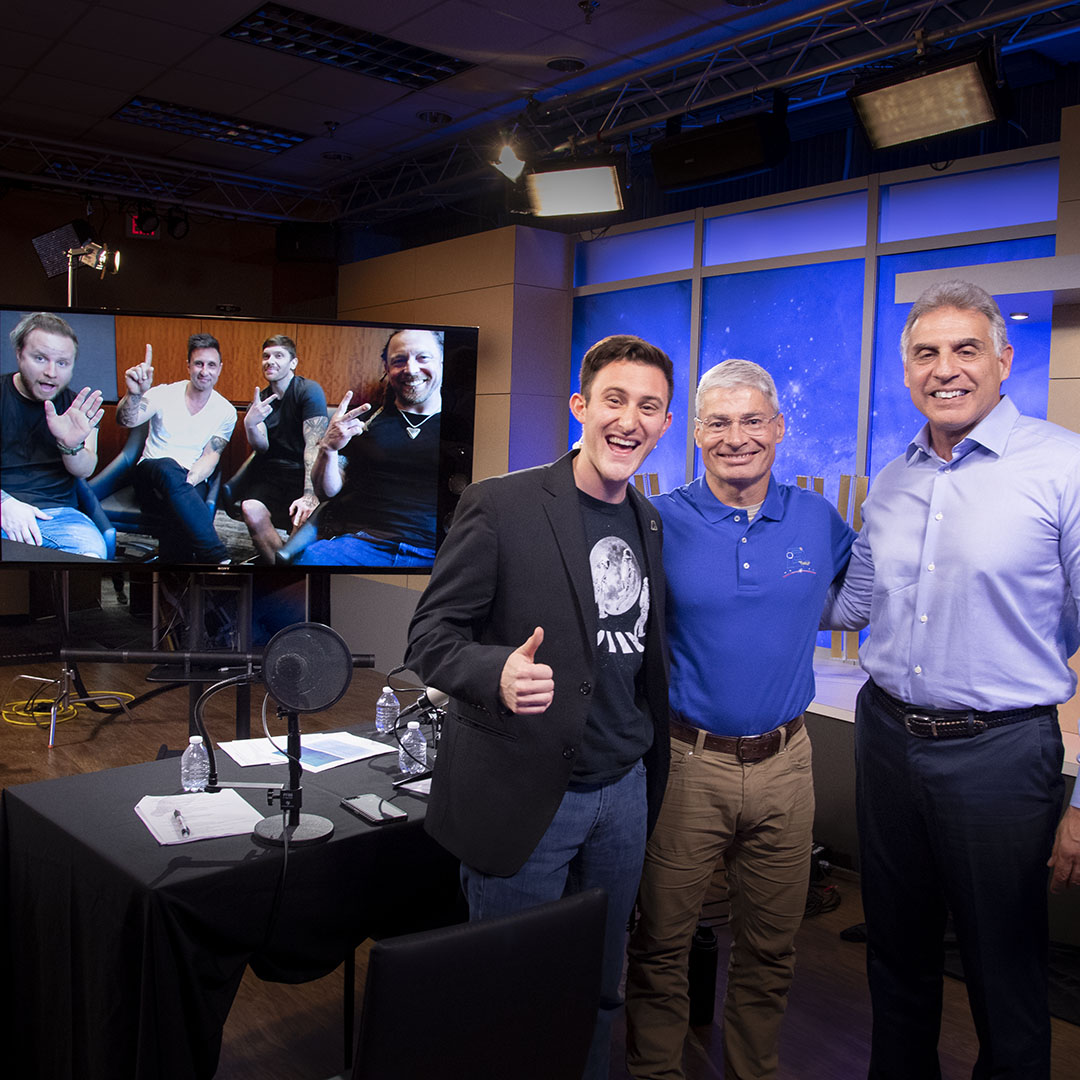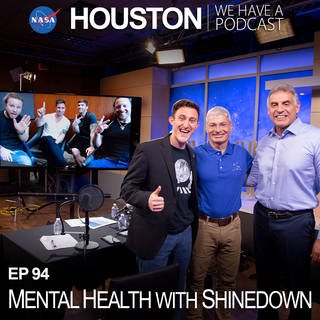
“Houston We Have a Podcast” is the official podcast of the NASA Johnson Space Center, the home of human spaceflight, stationed in Houston, Texas. We bring space right to you! On this podcast, you’ll learn from some of the brightest minds of America’s space agency as they discuss topics in engineering, science, technology and more. You’ll hear firsthand from astronauts what it’s like to launch atop a rocket, live in space and re-enter the Earth’s atmosphere. And you’ll listen in to the more human side of space as our guests tell stories of behind-the-scenes moments never heard before.
For Episode 94, in honor of Mental Health Awareness Month, NASA chats with the rock band Shinedown about the similarities and importance of mental health for orbiting astronauts, touring band members… and everyone! This episode was recorded on May 17, 2019.
Learn more about NASA’s Behavioral Health studies!
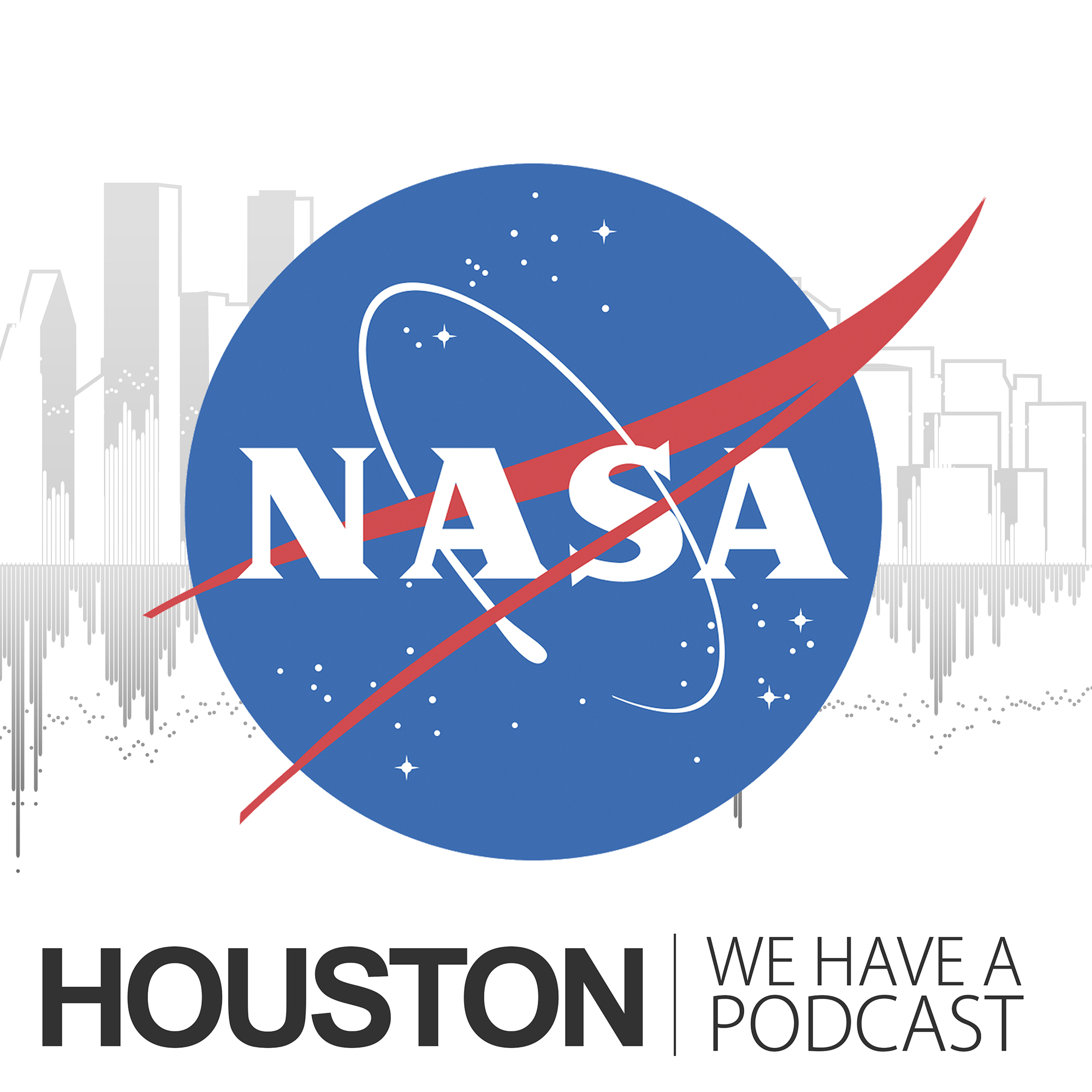
Transcript
Gary Jordan (Host): Houston, we have a podcast. Welcome to the official podcast of the NASA Johnson Space Center. Episode 94, Mental Health. I’m Gary Jordan, and I’ll be your host today. If you’re new to the show, we bring in the experts to talk about all the different parts of our space agency. And sometimes, we get a chance to bring in some folks from outside NASA and look at some parallels to human space flight that you might not even know existed. Today, we’re doing a special live video recording of the podcast. And we’re doing it for a few reasons. One is the topic. We’re talking mental health for mental health awareness month. We’re in a time now where long duration space flight is somewhat normal. People have been living and working on the space station for well over 18 years straight now, doing thousands of experiments. Many of those experiments are done to understand exactly what happens to the human body over time in space. Looking at everything from eyes to blood flow to muscle and bone loss and even understanding the overall mental health of our astronauts. Mental health will be a key component to understand, especially when humans travel farther away from home than ever before and for very long periods of time. There have been studies on the International Space Station looking at this. And most of them are focused on behavioral performance and how that may change when spending 6 months isolated aboard a space vehicle. Sustaining this performance on board is part of operations today. We always try to imagine what it would be like to be an astronaut, separated from society, adrift in interstellar space. A lot of science fiction based around space flight deeply examines the thoughts and emotions of an astronaut persevering through obstacles. But the reality can be quite different. Even comparable to jobs here on Earth. So, joining us to discuss mental health are Brent Smith, Eric Bass, Zach Myers, and Barry Kerch from the band, Shinedown. As a rock band, they’re very much used to hopping on a bus and spending months on the road, traveling from city to city, focusing on their mission. And giving it their best in every place they visit over the course of several months. They have their crew that they rely on but are separated from family and friends. Maybe connecting remotely from time to time. Otherwise, alternating between bus and venue. It can be an isolating experience. And finding ways to support their mental health can be very important. Shinedown is connecting with us at NASA, because A, they’ve experienced this isolation on the road plenty of times before. And B, they find mental health very important in their own lives and express these themes in their music. A lot of elements from life on the road and understanding mental health as a band can be compared to life aboard the International Space Station. So, with us to draw those comparisons are NASA astronaut, Mark Vande Hei, who spent 168 days in space. And psychologist, Dr. Jim Picano, with the University of Texas Medical Branch and NASA’s Behavioral Health and Performance group. He’s part of the operations to sustain behavioral performance and the mental health of astronauts during these months in space. And of course, mental health struggles can come from all kinds of sources throughout our lives other than just isolation. And it’s important to maintain this mental health. And that’s what we’re going to talk about today. Identifying these sources. So, let’s kick off our live recording of Houston We Have a Podcast with Shinedown. Enjoy.
[ Music ]
Host: Good afternoon, everybody. Thank you for joining us today. We are gathered here for a special live recording of Houston We Have a Podcast for a few reasons. One is it is mental health awareness month, so we’re here to talk about mental health. It’s something we don’t normally talk about, I think. Especially when it comes to astronauts. We usually talk about the physical health, the fluid shifts, the bone and the muscle loss that happens on the International Space Station. We don’t really get a chance to talk about the mental health. The second reason we’re gathered here today is because to really help fully tell this story, we can, you know, talk about the astronaut stuff and the stuff going on in space all day. But really, to help us relate it to stuff here on the ground, which is, again, one of my favorite sayings. On the ground. You have to specify that it’s on the planet Earth. One of the things that we can relate it to is a touring rock band. So, with us today is the band, Shinedown. Connecting with us, from left to right, let’s see. We have Zach Myers, there we go. Eric Bass, and then Barry Kerch, on the right there. Guys, thank you so much for joining us today.
Barry Kerch: How are you guys doing today?
Host: We’re fantastic. I’m so glad you can actually take the time to join us all the way from Norfolk, Virginia. And the reason Shinedown is connecting with us today is for a few reasons. One of them is they have actually written about mental health. It’s something that’s very important to them. So, they have thought about it very recently. And I’m excited to hear your guys’ thoughts on mental health. Especially the isolation and the fact that you guys are a touring rock band. And then, to my right, is the whole space element. Immediately to my right, we have Mark Vande Hei. Mark, thank you for joining me today.
Mark Vande Hei: My pleasure. Thanks very much.
Host: Mark, you spent 168 days in space from September 2017 to, I believe, February 2018. You worked on a number of experiments, did a lot of spacewalks. You were a very busy man on the International Space Station. So, I’m excited to hear your perspective on mental health during your stay in space. And of course, over here, we have Dr. Jim Picano. Jim, you are a senior operational psychologist with the University of Texas Medical Branch at Galveston in the Behavioral Health and Performance group at NASA. Three decades of psychology experience, including in the army, which is perfect. Sabot, you were in the army, as well. And contributing author to the paper called, “Risk of Adverse Cognitive or Behavioral Conditions and Psychiatric Disorders,” which I would summarize to say how mental health and behavioral performance can be affected in space. Jim, thank you for being here.
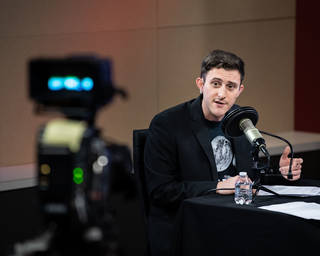
Dr. Jim Picano: Thank you. Great to be here.
Host: Alright, so, of course, mental health can be stressors from all different sources. Not just the isolation of being in space and touring as a rock band on the road. So, we’re really going to explore this here today. Thank you for joining us on Facebook Live and on NASA TV. Shinedown, I’m going to throw it to you guys first. I really want to understand. So, to draw this comparison. To really get this full story of what it’s like really. I mean, we’ve talked about the isolation on the International Space Station, but what is it like for you guys as a touring rock band. What are you guys going through?
Eric Bass: You know, first of all, I want to say we’re honored to talk to you guys. We all really appreciate you guys allowing us to do this. Everybody at NASA’s been really awesome. So, thank you. I’ve been a NASA fan since I was a little kid, so this is really cool.
Barry Kerch: Absolutely.
Eric Bass: But, you know, for us, it’s hours of boredom and moments of excitement. I think that’s probably the same things astronauts go through, I would imagine maybe. But, you know, it’s kind of what you make it out here. You know, we’re very fortunate in that we have a really good family unit on tour. We all still ride the same bus. We love each other. We’re brothers. You know, I think sometimes some other bands might think we have mental problems because we like each other so much. But, you know, for us, it’s about being a support system for each other. And that’s something that’s really huge for a touring band. There’s a reason why so many musicians fall into drugs, alcohol abuse. And deal with depression. It’s a lifestyle that on the outside seems super exciting, and it is in some aspects. But there’s nothing that can really prepare you for doing it. I remember when I joined the band, just after the band had gotten done touring their second record. So, I was kind of late to the game. I wasn’t an original member of the band. And I remember, you know, coming into this and just really just thinking about how exciting it was all going to be. And then pretty quickly getting a dose of reality, which is the immense amount of idle time that you end up with out here. And how are you going to spend that? It’s probably, I end up, me personally, I end up just making work for myself a lot now. I mean, I went through the period of alcohol, and we all did. Except for maybe Zach. Zach’s about the only one that held fast through everything. But, you know, becoming more sober. And really having to find a way to deal with the mental side of being on the road all the time. You know, I find work for myself. I make myself busy. Which is something that I know that the astronauts on the space station, Mark, they’re constantly looking after experiments and doing things. And there’s always something, there’s always a task to be done. And that’s something that I long for. I’m a very structured person. I grew up in a military family. So did Barry. My father was a naval commander. Barry’s father was an air force colonel, so you’re used to sort of a great structure in your house. And man, when you get out here, it’s anything but that. Or it can be anything but that. So, really, it’s finding a way to create structure where there is none. And, you know, like I said, outside of just having each other, that’s probably the second most important thing I can think of for us personally.
Host: Creating structure, but it sounds like that element of connection. Especially because you guys are so close. Having that sort of family aspect is something that’s very important to maintain throughout the entire tour. Is it true for just the band, too? Or even your own families?
Barry Kerch: I think it’s a little bit of both. Definitely with the band, because we spend more time with each other than we do with our families at home. Three out of 4 of us are married. And three out of the 4 of us have kids. So, we have a great home structure at home that we long for and that we miss, because I think last year we were only home 31 days out of the whole year. So, we are gone long stretches at a time. But having the support system out here. And then having supportive wives and that kind of thing. We’re a lot luckier in some respect that we’re not way up in space. And we can actually get off the bus and go wander or bring our families out occasionally when they have the opportunity. So, you know, those times help. But, like Eric said, it’s that we have a support group. The monotony. The backstage of any venue looks exactly the same as any other venue, so it turns into Groundhog Day. Okay, today we’re in a hotel. Okay, tomorrow’s the show. Same thing. Here’s your showtime. Here’s your meet and greet times. And it becomes really mundane. And if you don’t find something to do, I think along with creating work for ourselves, the biggest thing is our health aspect and taking care of ourselves. We all make it an effort now to work out together every single show day. We work out on days off. And having that exercise has probably kept a lot of those older demons at bay.
Host: I think that’s huge. Mark, I’m hearing a lot of parallels when it comes to space flight. Now, how does that compare from what you’re hearing about what Shinedown’s going through as a touring rock band. What are you doing on the Space Station?
Mark Vande Hei: Well, there’s a lot of parallels and there’s a lot of differences, too. What struck me was dealing with boredom. For me, on the Space Station, that 6-month, roughly, period, I assumed was the only 6 months I would ever be in space. And it felt like I couldn’t possibly, like, I had all these personal goals I wanted to do. Pictures of places I wanted to take for people. Pictures of things they gave me to take of things that were gifts for them later in space. And in addition to that, every single day was a list of tasks that, at least at first, were all new. I might’ve been trained on them. But if you get trained on 1 thing for an hour, and 2 years later, you have to do it. It’s kind of hard to remember exactly what it was you were shown. Things might look familiar. But it’s an environment for us where you have to do everything in exacting detail. Otherwise, you’re going to break something that maybe some scientist spent their whole life trying to get to the Space Station. So, there’s a lot of pressure on every, and I’m sure when you’re making music, too, it’s about, you’ve got so many minute details. But for me, it was this kind of grind where I just couldn’t relax. I couldn’t find a time to slow down. I felt like even when I had free time, I had to make as good a use of it as possible, or I was going to regret it. Making contact with family was huge. The relationships on my crew, certainly a very good parallel with what you have. I was with 5 other people that I would call very, very good campers to spend time with. So, it was nice being off the planet with them. We got along great. And when one of us was having a hard time, we could tell, and we just took good care of each other. And exercise, too. Another thing that was a very important parallel with what you just talked about. Thankfully, part of that busy schedule for us involves time that NASA sets aside for us to exercise every day. Even though there were sometimes when I felt really sorry for myself running on a treadmill that was mounted on a wall, running towards the ground with bungee cords on my hips and shoulders to hold me on the treadmill. But, yeah, that was a really important time for me to keep sane.
Host: Yeah, I can see a lot of the differences, especially with you having to find free time. And then you guys having a lot of free time and trying to find ways to fill it. But what really struck me was when I heard about the length of time. And that was something that I think can be taxing in and of itself. When you’re touring for so long that you don’t have, I mean, it seems like you’re trying to find time to fill. But you’re still busy. You’re still isolated. You’re still working. You’re still on tour. What’s it like, the length of time? How was that taxing?
Zach Myers: I mean, the length of it. We try to take more breaks now. But I mean, something like last year was really hard. Because last year, like you said, we started in March of last year with rehearsals. And we were literally gone all year, other than 32 days. It wasn’t like 32 days at one time. It was like 5 days here, 6 days here. So, that length of time gets long. But, like you said, having those relationships with us actually getting along. At this point, we could have different buses and stuff. We don’t. We actually enjoy being together, so it makes it a little easier. And like you said, we’re down here. We can FaceTime. We can do things like that. And it’s not, you don’t have to be at a certain time of day where we can get a connection. Like, I can’t imagine being up there for 6 months at a time and, you know, there’s only certain times of day, you know, where you can call or things like that. And when you have a certain allotted time. I can call my wife on FaceTime and see my kids at any time. So, like you said, the parallels are similar but very different on different planes, you know, as far as that goes. It’s like, you know, the ease of things like that. But what you described is, like, you know, being up there and having a task to do. That’s him, you know. He makes tasks to do.
Eric Bass: It’s actually, that’s a very unusual, but I won’t say unusual, but very interesting parallel. What you were talking about, about not feeling like you had enough time and feeling like you had to always be on go with certain things. I do that to myself. And it started as a way for me to deal with the depression. And it’s kind of become a, I won’t say a hindrance, but it’s become sort of an OCD thing with me, where I feel like I have a certain amount of time, a finite amount of time to accomplish things I want to accomplish. And if I’m not doing those things all the time, then I’m somehow being slack or lax or something. It’s hard to relax sometimes with those things. I was talking to a friend of mine the other day who said that she had the same thing. She’d been diagnosed with something called hyper mania, and I’m sure the doctor could fill me in on that. But it sounded very familiar to what she was saying, where it is really, and I don’t know if that just comes with being away, you know. Away from home or something, but always feeling like that I need to be moving forward and accomplishing things. You know, rather than letting the, you know, because we have a saying out here. It’s just a saying, but it’s, you stop, you die. You know, we can’t put on the brakes. We can’t pump the brakes. You know, we have to keep moving in order to, for me to keep the depression at bay and that sort of thing. So, I did identify with what you said about feeling like you, you know, you have to be going all the time and doing your experiments and that sort of thing. And staying on top of it. The work I’m doing maybe isn’t as scientifically important, but definitely I have that thing where I feel like I have to move, move, move. And Mr. Smith. Mr. Brent Smith just joined us.
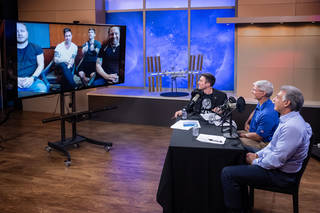
Brent Smith: I’m so, so sorry. I apologize.
Zach Myers: He actually was not on a treadmill attached to bungee cords, running towards the floor [laughter].
Brent Smith: I most certainly wasn’t. I had an altercation with a polar bear, [Laughter] and it was a misunderstanding. I apologize for my tardiness.
Host: [Laughter] No worries at all. We’re happy to have you. Alright, so, Eric, what you were talking about has to deal with sort of, you know, filling the time. Keeping yourself busy. Mark, when you were on station, did you feel that the business, the rapid pace of everything on station did keep you distracted? Or was it mentally taxing to have all of those things?
Mark Vande Hei: It depended a lot on how successful I felt about keeping up with the plan. So, the way it works on the space station is we have a schedule that the ground very carefully coordinates, deconflicts, so that even little things. Like making sure that the one place where we can simulate lifting weights, that only one crew member is scheduled for that at a time, for example. That schedule shows up as a graph, where everybody’s got a line on it. And the current time of day shows up as a red line. And that red line just keeps marching across the day. And you’ve got chunks that are activities. And you can click on your activity on any of the space station computers. And it’ll tell you, “Hey, that activity means you do these things.” And it’s got step by step. It’s kind of like Christmas morning, putting together toys, all day, every day of the week. And then, the good news is, at first, well, the challenge is, at first, when you look at that. Like, I don’t even, wow, I’m not even sure what that sentence means, much like sometimes when you’re putting together a toy. But as time goes on, you get more and more of those activities that are something you’re familiar with. And you can look at the whole plan, like, “Oh, I got that. This is all familiar.” But at the beginning, it’s the unknown part. And when you realize that this was only scheduled for an hour. It took me an hour and a half to get done with it. Now, I’m working on the next thing. And you keep falling farther and farther behind. So, at first, when that happens more frequently, it’s challenging. As time goes on, you start getting ahead further and further, and you’re able to, it feels really good when you’re a little bit ahead of the timeline. And you can look at your other crewmates and say, “Hey, how’re you doing? Can you use any help on this?” And those are my best days. When I was able to help other people with their stuff instead of needing help from other people all the time.
Host: Jim, I think this is a good time to bring you in, because you’re a senior operational psychologist. And I think that means you’re involved in the day-to-day stuff. You’re involved with what’s happening with the crew on board the station now. So, what’s your job? What’re you doing to help the crew?
Dr. Jim Picano: Yeah, so, that may be a term that’s probably unfamiliar to a lot of people. Operational psychologist. Actually, it’s a general framework. What we do is work with personnel who are conducting real-world, high-risk missions, like astronauts. Our background comes from the DoD, where there are a number of operational psychologists who support soldiers, who also have to conduct these harsh and very dangerous missions. And our role is to, in a sense, keep high-functioning people functioning and healthy. So, we really try to optimize and enhance their health and wellbeing. Their behavioral health and wellbeing. In our business, it’s much easier to prevent a problem than to have to intervene with a problem. As you can imagine, it would be very difficult for us to intervene with a behavioral health problem on the station. We’re not there, and there are certain limitations in what we can do. So, we have a whole spectrum of things that we do to help support astronauts once they’re deployed on station. But our work really begins well before then, in the lifecycle of an astronaut. So, we’ll get involved in the evaluations of an applicant’s suitability to become an astronaut. Because one of the best ways for us to prevent a problem is to make sure that we have only folks who are psychologically suitable to do the work of an astronaut. Or a special operations soldier or one of the other kinds of special jobs that are out there that involve high risk and high stress. So, our work begins very early on in trying to find the right person for the job. Once that part is done, we get involved in the training of astronauts from a behavioral health perspective. And here at NASA, we train in aspects of what we call expeditionary skills. Which really take the many competencies that people like Mark have and try to develop those in areas that are important to living and working in space for prolonged periods of time. And so, we will work on some of the very things that you guys were talking about. And we train and educate in those areas. Like, for example, the importance of self-care. Taking care of yourself when you’re on the road, same as an astronaut. Providing that self-care is very important in order to maintain the reserves that you need to perform effectively on the job. As Mark has said, and as you probably have figured out, a space environment’s a very depleting environment. It takes a lot of your physical and mental energy. And so, you have to work really hard to do that. So, we have another part of our job where we will be involved with astronauts once they are deployed on station through a series of countermeasures that are deployed on station. As well as time that we get to talk with them in something we call a private psychological conference. And that is part of a spectrum of services that we provide to try to optimize the behavioral health of our folks.
Host: Yeah, just one of the many things to sort of keep them going. One of the things I picked out was, you know, in the terms of astronaut selection. You’re talking about these guys, Mark included, were selected for a purpose. They are ready for space flight. They are not only physically and they have the knowledge, but they’re mentally ready for that. Shinedown, when it comes to you guys, going on the road. You know, I think creating music might be one thing, but then touring and performing music is another thing you’ve got to be mentally ready for. How do those things compare for you?
Eric Bass: Well, we really don’t crosspollinate those 2 things, actually. We don’t write very much on the road. We tend to take time off to write. It’s a little easier for us to be creative when we’re not touring, because touring is so grueling and regimented. But it parallels just what you guys were saying. We have a saying that is, either you’re built for this, or you’re not. You know, and what we mean is, you’re either built to do this in a healthy way, or you’re not. I mean, we see plenty of people fall apart and can’t handle it. And we’re just actually, we didn’t have a psychological program we could go through to see if we were or not. I think our psychological program was a lot of trial and error.
Zach Myers: It would’ve been very helpful, though.
Eric Bass: It would’ve been very helpful, actually [laughter]. Did you say it wouldn’t or would have?
Zach Myers: Would have!
Eric Bass: Would have, yeah. I’m sure. But, you know, we um…
Brent Smith: We try to never go to bed angry.
Eric Bass: Yeah.
Brent Smith: Basically. I mean, it is definitely like a marriage. We’ve also been doing it for 2 decades. We were lucky enough in the beginning, in the very early 20s of our career, we kind of got some of the chaos out of the way. And as we got older and as the craft of songwriting and then building the performance started to grow, because we wanted to go the extra mile on that, we started just keeping each other in check even more. We’re very lucky because we have the 4 of us on the road. The other thing, too, is we’re in a position in our career where, if we wanted to ride in separate buses, we could. If we wanted separate dressing rooms, we could. We choose not to do that, because we actually genuinely respect and love one another. And we’re also on the road 280 days out of the year, if not more. So, for us, we have to kind of keep each other in check.
Eric Bass: Yeah.
Host: Yeah, I’m hearing a lot of elements when it comes to when you guys started, you just sort of had to hit the ground running, you know? You started music, and you were touring, and you were just going. And I think there’s sort of a parallel there, Mark, when it comes to training. Because you’re not necessarily, it’s not like you get selected and you get launched up to the station. You are preparing very much for your trip to space. And I think it’s important, not only from the aspect of actually getting prepared for the systems part, for the science part, for all of those parts. But for the relationship part, because who you’re training with are the people, I think, you would ultimately fly with.
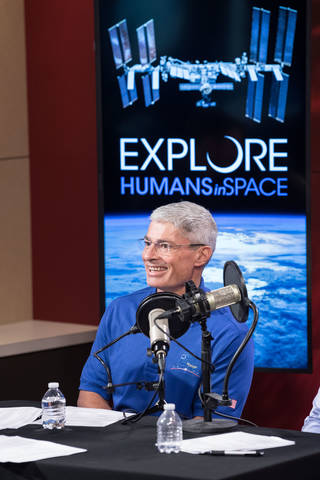
Mark Vande Hei: There’s parts of that are true and parts of that are not. So, the interesting thing is when we train as, for example, I was initially going to be 1 crew member from the United States on a Russian space craft with 2 Russians. And so, my crewmates lived in Russia. They would train. I would show up for a limited amount of time and train with them. But when I was back in the United States, I was on a separate schedule from other astronauts. Sometimes I would cross paths with somebody, but it wasn’t like I had a shuttle crew of 6 people in addition to me that was going to train everything together. Or at least always do, like, spacewalk training would be 4 people all working together. Maybe a couple of people coaching. The people in the water training. While the people actually going to do the spacewalk are underwater. So, as a space station crew member, it’s much more isolating in that regard. In fact, I was working in Washington, D.C., recently, and someone said, “It must be much more exciting working in the astronaut office than working in NASA headquarters.” And I was so engaged with getting things done, making decisions, lots of people contact. Much more like when I was in the military, that I said, “You know, actually, working in the astronaut office is much more like being a student, where I’m working all day in the library. And then every now and then I go to a club meeting, type of thing.” So, there’s lots of studying. Lots of trying to make sure that your individual skills are really good. Certainly, I can also relate to, while I was in Russia training, we’d have a limited number of people from the United States. We would all live together. We had options to live in 1 of 6 cottages. And those cottages could have 3 people living in each one of them. It was always better for me when I was living with somebody else. Because, you know, I’d wake up, have that casual conversation while I was getting a cup of coffee. If I was trying to study something, and the other person had the class recently or was in the class with me. If I had a question, I could say, “Hey, what does this mean?” And I ended up being a much more effective student and person when I had that kind of casual, real easy contact that’s just associated with having people in proximity.
Host: We’re talking a lot about relationships. I do want to shift gears a little bit, go back to mental health. And kind of read some stuff about mental illnesses. Overall, 1 in 6 Americans have a mental illness. And 4.2% of adults identify as having a severe mental illness that significantly impairs functioning. A lot of these are 18- to 25-year-olds. We’re talking about the younger generation. When it comes to anxiety disorders, it has 3.1%, but these are 2016 numbers. These numbers are keeping to increase. It seems like it’s a topic that is very much present, but it’s not something that we normally talk about. So, guys, you guys have written about music, written in your music about mental health. Shared it with the world. Tell me about what you think about that, about the fact that we’re not sharing mental health. And how it is important to bring this up and to talk about it.
Eric Bass: I think it’s, you know, it’s sad that you can, you know, you break your leg, go to the doctor, get it fixed, and you walk around on crutches. And the whole world can see that you’re on crutches. And everybody is sympathetic to your plight. And you know, offering you good will and hope you get well soon and everything else. And it’s much more difficult with having depression. At least for me. This is the first time I’ve ever talked about it really was when we did this record, our most current record. Because Brent, you know, Brent and I were writing a song together. And he brought the song in, and it was about… where he’d written lyrics about me and what I go through. And it was very personal. So, you know, I’d always chosen to keep those things between my wife, myself, and my friends. And that was really it. Because quite frankly, I was embarrassed about it to an extent. And you don’t want to show the chink in the armor, you know, the scars and the imperfections in your mind, because it’s such a personal thing. And I think that’s where the stigma comes from is nobody wants to show any mental weakness. We’re not a society that really smiles on that sort of thing. It’s not a weakness, but you just don’t want to show any sort of imperfections, let’s say. And it’s, you know, I really think it’s time to start viewing these things as what they are. Just another, you know, physical, chemical makeup of your brain that causes you to have certain feelings or be a certain way. There are tools and help available to fix it, just like putting a cast on your leg, you know. And I think that social media has a lot to do with the way the numbers are going for kids having anxiety, young people having anxiety. Because everything is so hyper…
Brent Smith: Microscoped.
Eric Bass: Yeah, you’re under a, everything seems so, you know, when I was younger, I wasn’t aware of what was going on a thousand miles away from me. Right now, you know, it’s there in an instant. And I don’t think there are any more problems in the world than there were, you know, 40 years ago. I just think they’re more present. They’re more available, so you feel like the sky is falling. And they can, believe me, I’ve had times when I just signed off of all social media. Because I have to. I find myself starting to fall into the moods because of things I see or the way people are talking to me. Or the way people are talking about friends of mine, or whatever. And also, people are more apt to be a little braver online than they’re going to be in personal, everyday encounters. I think a lot of that feeds into the numbers we’re seeing and, you know, the anxiety especially that people feel. I can’t imagine being a young person and coming up now and everybody. I say “everybody.” I mean, that’s kind of painting a broad stroke, but people seem to be so judgmental online. Then you’re going to go out in public and, you know, put yourself out there. And it can make you very much want to just stay inside.
Brent Smith: I think there’s another bigger picture, too, that he’s touching on, which is the fact that there’s a difference between being depressed. And there may be a chemical imbalance or there might be a physical issue going on. And then having a case of the Mondays. You know what I mean? Like, there’s a big difference in that. I’ll give you an example for me. Something about 2-and-a-half years ago I had to do personally for me in regards to social media, like Eric was saying. Zach has a really, really good quote that he kind of keeps us in check with, just looking at the big picture. He’s always said, “It’s not about the painter, it’s about the painting.” So, you have to look at everything from all angles sometimes. And that’s difficult to do, but something I started doing about, I guess it was about a year-and-a-half ago. I have 2 alarms when I wake up, whether I’m on the road, I’m touring, or I’m just out in my life. The first alarm wakes me up, and then the second alarm is an hour after that. But the very first hour that I am up in the morning, that’s mine. I don’t look at my phone. I don’t really talk to anybody. And they know when I kind of come in, they know that I’m not being rude. They’re, like, he just woke up, he’s got an hour. Because that’s my meditation, you know what I mean? That’s a way for me to center myself. Because guess what? The phone isn’t going to go away. You know what I mean? It’s not going to be gone tomorrow. And neither is anyone’s comments or opinions. You have to try to find, I think, especially for the younger generation, too, it’s such a different, you know, this instant gratification. It takes a little bit of adjusting, and you’re always going to be adjusting. But you got to do it for you. You know what I mean? And what I mean by “it” is you have to live your life, you know, in the way that’s going to make you happy first before you’ll ever make anybody else happy. I think sometimes people forget that, but it’s something you’ve got to keep in check, you know?
And on the other side, with Eric and, you know, all that we were doing. Really putting ourselves out there in the last year-and-a-half with what we do, I learned more about him. You know what I mean? I learned so many wonderful, beautiful, artistic, you know, interesting things about him. I learned a ton more about Barry. I learned a ton more about Zach. And we learned a ton more about each other, because once again, we talked to one another. He pinpointed something that a lot of people are having an issue with. Whether you’re younger, middle aged, or you’re a little bit older. People don’t need to feel ashamed because they feel a little off. You know what I mean? There’s nothing wrong with you, and you shouldn’t feel embarrassed. If you need to talk to somebody, go talk to them. And here’s the other thing, if you notice somebody out in your own life, even if it’s a total stranger, and you can tell there’s something off maybe, go up to that person and ask them how they’re doing. What we don’t want people to lose in the big picture, don’t lose your humanity. Don’t lose your empathy for each other. Build each other up. There’s no reason to bring each other down.
Eric Bass: Empathy is a big word that comes up a lot when we’re talking about these things. It’s such a huge thing is, you know, never forget. You know, at the end, there’s that quote, you know, “Be kind to everyone, because you don’t know what they’re going through” or “what battle they might be fighting.” And you know, that’s something that seems to kind of get lost in this age of, like you said, hypertechnology and hyperspeed and everything else is just being empathetic to other people and to what they could be going through. You know, it’s just such a, it means a lot, I’ll tell you that. I mean, look. When these guys come to me, and they can tell when I’m down, it really does help, just them asking, “Hey, you okay?” You know, and I might be okay. I might just be having a, you know, a time. And I know I’m okay. I’ll tell them I’m okay. If I’m not okay, I’ll tell them I’m not okay. We have that kind of relationship, and that’s really, really important to us, you know, as a band, is being able to be open like that. I’ll have sometimes when I go, at the end of the last European run that we did, it was getting, it was cold. It was wintertime in Russia, Mark. So, there you go. You can, you know exactly what I’m talking about. So, it’s not the best landscape for depression, either. But, you know, I was spending a lot of time by myself. And without a lot to do, because we were over in Europe. And I didn’t have all the creature comforts with me and that sort of thing. And I was going pretty dark, you know. I was having a really tough time. It was almost a self-imposed isolation in some ways. I didn’t feel like seeing people and that sort of thing. And they really kept me in check. They could see something was wrong, you know. And it’s just so important to have people around like that. And once again, I think that kind of leads us back to what, you know, some of the problems with space travel and being isolated for, you know, vast amounts of time. Or you can be isolated, like kind of going to Mars or whatever. You know, right now with the current propulsion, that’s what, like 6 months or something just to get there in a spaceship with you and a few other people. That could be really mind numbing if you’re not mentally prepared. Even if you are. Like I said, I’m built to do this job. I’m built to be out here on tour, and it still becomes, you know, something that the internal battle sometimes can be pretty daunting.
Host: I think a major theme, what you’re talking about, Eric and Brent, is the fact that you’re identifying these things. You’re recognizing these problems, and you’re thinking about them. And I think that’s something that’s very important to make human spaceflight successful is to recognize it, to identify what could be the problem. How could these things be affected? And Jim, you’re doing a lot of that work. That paper you wrote was identifying these are the risks that could, of behavioral performance, was the main thing, mental health and behavioral performance, for human space flight. What are those risks? What have you identified as risks that could affect human space flight?
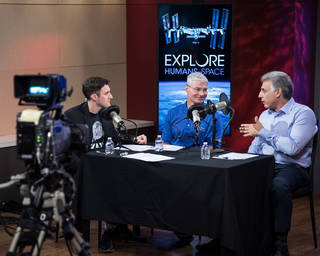
Dr. Jim Picano: Well, first of all, let me just say thank you guys for the courage to share your stories. And to share what you are doing, because that goes a long way to helping others come forward and getting the help they need. With folks like you and other celebrities and athletes actually doing that, role models for kids, for example, who are really struggling. It’s really great that you’re willing to put yourselves out there and do that so that others can see you and know that you can be successful. You can be popular. And get help. And really, thank you for that. So, when it comes to the kind of psychological aspects of spaceflight, you know, we’ve talked about how harsh the environment can be physically. And typically, as we think about even the current ISS and future missions, the environment is one of, you know, microgravity, high carbon dioxide levels, social isolation. And isolation, say, from loved ones, friends, family, and even happenings here on the planet. Our culture, what’s going on in the world. Confinement. The idea that you can’t step outside and catch a breath of air if you really just want to clear your head. It’s hard to get away in a small environment like that. And even though the ISS is a well-developed habitat for its place in its development, it’s not like being here. And there are just certain things that aren’t available to our astronauts for coping. And so, the other piece of that, I think is, you know, the stress of performance that we’re talking about, that Mark was talking about. Having to be, you know, having to work with the precision and with the intensity. And take, for example, the threats that are, you know, to performance, say, in a spacewalk. Mark’s done, you know, 4 spacewalks. The intensity of concentration in that really dangerous environment where you really have this feeling like you have to pay attention to what you’re doing always. And there’s almost no room for error. And so, all of those are kinds of psychological stressors. And the ones that we get most concerned about that, because our astronauts are technically highly skilled and very well trained, are the kinds of things that have to do with the environment itself and the condition psychologically. One of the things that was impressive to hear you guys talk about was sort of how a crew gets along. The cohesion that you feel. The attention you have to others’ morale and taking care of one another. That’s very much what we are hoping our crews will develop on orbit. To have that kind of connectedness to one another to watch each other, to take care of one another, and to develop that sort of bond. And that’s a very important feature of being able to cope and adapt in space. But it’s a bit of a double-edged sword, because Mark is there with 4 or 5 of his very best friends, and that’s it. There’s something we call social monotony. So, you know, can you imagine having that sort of like you described on your tour bus. You are there, day and night, together. And while you know each other very well, sometimes you just want a break, right? And you want to kind of to have that alone time or maybe to talk to other people. And so, there are some things on station that help with that. For example, private crew quarters. The ability to kind of get away, get into your phonebooth-size, Mark, I guess, crew quarters. I don’t know if people even know what a phonebooth is anymore but small [laughter].
Host: I don’t know. [laughs]
Dr. Jim Picano: Who knows?
Mark Vande Hei: Watch Superman movies.
Dr. Jim Picano: Yeah. But to get away and have some quiet time to recharge, to just be a little bit by yourself. That’s important in sort of taking care of yourself when you’re in that kind of environment. So, despite the isolation that we talk about in a vehicle that’s orbiting the Earth or on its way to the Moon or Mars, you actually need private time, even though you are “isolated.” So, that’s another example of how these stressors play out. And we have things that we have our astronauts have available to them to cope with these. And if you think about isolation and confinement for us, it’s sort of think about the opposite. How do you normalize that kind of environment so that it feels a little bit more like home? And so, we’re fortunate to have a bunch of countermeasures available to our astronauts to be able to counteract some of those stressors involved. Like, for example, the opportunity to call home that you guys mentioned, you know. Yes, it’s not the same as taking your cell phone and, you know, calling anytime. But it’s pretty good, as long as we have the communications available. We also are able to connect our astronauts with their families. It’s only once a week, but they get a video call with their families, and it’s an opportunity to, you know, be in the family, be with the kids, be with the spouse, and to, you know, see what’s going on at home. You know, it’s a way to maintain that connection. We, you know, pipe up current events, movies, music. Things that astronauts can use to stay connected here with events down on the Earth. So, they don’t get that sense of isolation and confinement.
Host: Yeah, it’s like that free time is not just, you know, here’s some time. It’s actually important to have that sort of time for that mental relief when you’re so busy on the space station. Mark, what do you remember from your expedition about the team dynamics and the free time and alone time that you needed during your stay?
Mark Vande Hei: So, one of the team dynamics that kind of makes me smile was, so, I ended up launching with Joe Acaba, another US astronaut, and Sasha Misurkin, the commander for the space craft. And I love both Joe and Sasha a ton. But because I spent more time with Joe, Joe and I worked out a thing. I know I can be really goofy or overly serious. And I told him, “Hey, if I’m ever being, if I’m being too goofy, if it’s starting to look like I’m being unprofessional or I’m kind of getting too grumpy, just look at me and say ‘midrange.’” And he didn’t do it very often, but when he said ‘midrange’ to me, I’d be, like, “Really? Is it that bad? Really?” So, I needed that feedback mechanism, and it cracks me up, because he would definitely be the guy that would do that. And the other thing was a sense that we had a lot of fun just giving each other a hard time about stuff. And I knew if I did a minor thing that was irritating, instead of going to bed angry about it, he would make a joke about it. And then that would just open it up. It would be, we’d get it out there. I’d know that that was an issue, I wouldn’t do it anymore. I’ve probably got some funny stories I shouldn’t share here about exactly the details of that. But, yeah, that was really helpful for me. Somebody who’d give me feedback that I knew was feedback from a good place. Where I knew they were on my side. And the reason they were telling me these things that might not be comfortable for me to hear, was in my best interest to hear.
Host: So, what about the idea of alone time or free time for you? What did you, did you need that? Or was it, you’d get enough space where it wasn’t really a requirement?
Mark Vande Hei: I definitely needed it. We kind of had a rule where, so, on a weekend, we’d have a lot of time off. Basically, there’s 3 hours of housecleaning on any given weekend. And then ideally it’s just your time. And if somebody, imagine the 4 bedrooms, the 4 crew quarters. The really little closets. But you’ve got 1 person on the ceiling, 1 person on each wall, and 1 person on the floor. And it’s basically phone booths, like you mentioned, mounted to each of those locations. The direction doesn’t really matter. But they’re all in close proximity to each other. And if you’re an energetic person, like I am in the morning, and you want to get moving and you want to have a conversation right next to those crew quarters where you’ve got another crewmate that’s next door. If somebody had their door shut, we knew that meant that they needed quiet time. So, we should try to stay quiet outside there. That’s just a little cultural thing we had on the space station. But there was times when, on a Saturday morning, I might be feeling a little worn out. And I would just be there. I had a laptop in there. I’d start watching a movie. And that was a nice way to just decompress.
Host: Just time by yourself. But you had the weekends. Guys, I don’t think you have weekends when you’re touring.
Eric Bass: We generally have, you know, 2 shows on, 1 day off, 3 shows on, 1 day off, 2 shows on, 1 day off. Occasionally, we just got done with 2 days off in a row, which never happens. Which we really enjoyed.
Brent Smith: But we can go get a hamburger.
[Laughter]
Eric Bass: We can go get a hamburger. And we’re—right, yeah.
Brent Smith: We can’t—we’re not up there.
Eric Bass: Actually, I have a question for both Mark, I think it’s for both Mark and Dr. Jim, there. You can both probably chime in on this. So, for me, one of the issues I have being on tour is my hobbies. So, my hobbies that I love to do, and the things I love to do, really aren’t conducive to being on tour. And I’ve had to kind of find creative ways to occupy my time when I can’t do those things. Is it something where, Mark, did you have any hobbies that you could take with you up there? Or Jim, do you guys give the astronauts, is that something that goes into the psychological training is maybe cultivating new hobbies that maybe they can get into in a space environment or something like that? To where, because I honestly, those things, I think, Brent likes to quote Dwayne Johnson, The Rock, a lot. And he has this thing about “find your anchor.” You know, find that thing in your life that you can anchor yourself to. And that’s a hard thing for me to do on tour is having my anchor. And I just didn’t know if that was something that was, you know, that, like I said, once again, that Dr. Jim, that you guys would suggest to them, to find something they can do in a space station environment? Or Mark, was that something that you, did you already have something, other than maybe watching movies, that you could do?
Mark Vande Hei: Well, so, there’s 1 thing that I brought forward with me to the space station. Reading. I liked reading. And it turned out that if I was spending too much time on the screen just before going to bed, I wouldn’t be able to fall asleep very well. So, I managed to find a little, we call them cargo transfer bags, full of books that other people had left behind. Or that someone had sent out on a care package. So, I started reading a real book before going to sleep. That helped me out a ton. But a hobby that was great on the space station to learn about was photography. Because we had a lot of really, really good cameras. I mean, with lenses that were so big I probably couldn’t lift them on the ground. But of course, they just float in space. And a lot of good advice on how to use the cameras. Incredibly good subject matter to take pictures of. So, that was a new hobby that I picked up in space. And then, finally, I guess a hobby that I missed that I couldn’t possibly be doing. I really love watersports. I’m a very fledgling surfer. I’m still trying to learn. But I like windsurfing. And I couldn’t do any of that certainly in space. And I missed being outside and kind of the feel of the water and the wind and the sand. So.
Dr. Jim Picano: It did remind me of one thing that is part of our countermeasures. And that is something that we call the crew care package. And it’s a little bit like exactly what it sounds like. Like, when parents might send care packages to their children at camp or in college. And you know, Mark gives you a sense of these bags. They’re not very big. And so, there’s not much you can put in them. But to the point of supporting hobbies. As you can imagine, it’s quite limited because of the environment, you know, and the constraints on things that you can fly in space because of the danger it might present to our astronauts. But one of the things we have sent up in these crew care packages, and you guys will appreciate this, are musical instruments. And so, there are instruments on board the station. And, you know, astronauts never cease to amaze me with how talented they are. You know, they are folks who can do multiple different things really well. And I’m not one of those people [laughs], so I always am impressed by how talented they are. And we’ve had some really talented musicians on station. And of course, you know, we’ve had a French astronaut play the saxophone on station. We have guitars on station. So, folks who have music as a hobby and play music as a hobby. There’s actually a NASA astronaut band, I believe, Mark?
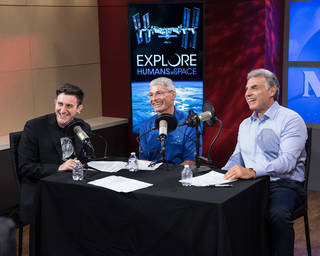
Mark Vande Hei: MaxQ I don’t know if it’s still active, but we certainly have had a couple.
Dr. Jim Picano: So, there are instruments on the space station, believe it or not [laughter].
Host: So, Jim, when you’re thinking about these mental health ways to relax, focusing on this, especially with the space station, which has been in orbit for more than 20 years. And continuously habited for, I think it’s coming up on 19, now, years straight. Things are going to change when we go forward to the Moon. We’re talking about going back to the Moon in 2024, boots on the Moon. What can we take from space station to the Moon and what’s different?
Dr. Jim Picano: Well, fortunately, we’ve learned a lot about what keeps folks healthy in space. And we basically use a couple of parameters that we sort of figure these things into when we decide how to provide those kind of countermeasures. The first is habitable volume. The larger the space, obviously, the better. And the other is the austerity of that environment. How mature that environment is for what it can provide. And so, as you point out, the station is fairly large habitable volume. And it its maturity has a lot of “creature comforts.” And I say that really in quotes, because it’s not a truly comfortable place, but there are some things there. And so, we’re going to give up some of those creature comforts for sure as we look at, you know, the upcoming lunar missions, for example, and maybe future Mars missions. Because the vehicles will be smaller. And they’ll be more austere. So, we won’t be able to have musical instruments, for example, on board. Some of the other, the robustness of the exercise equipment, and all that sort of stuff that we rely on now. Fortunately, much of the stuff that we rely on are effective in the short term for us. Because we rely on communications, bandwidth, and the ability to load data files. And so, the ability to keep music going up to the station for their enjoyment. Videos and movies. And to have real-time communications back home. So that Mark can make a phone call to his family, to see his family on a video screen. And you know, have a conversation with them. And so, fortunately, those will be available to us in the upcoming missions to the Moon. Because we’ll have real-time communication and hopefully the engineers will give us bandwidth that we ask for to do that. Things will change dramatically as we think ab out going to Mars. We will lose real-time communication at some point. And there’ll be a communication delay. So, we’re going to need to rethink how we provide some of these things for the future. And how we manage those expectations. You know, you guys mentioned earlier the ability to sort of tune out from social media because of the overload of just having immediate communication all the time. But we’re raising future generations to be kind of communicate that way, you know. To send a brief text message and to communicate in that kind of way instead of, say, picking up the phone and having a conversation or seeing somebody face to face and having a conversation. And so, I worry a little bit about future generations that are used to communicating in instant time and that not being available. You know, not having the ability to, you know, have a Skype session because of com delay. Or have a phone call. Or send a text message or an email. And so, we’re going to have to think about some of the ways to keep people connected to manage the expectations around communication and to try to maximize the technology that we have available to support folks in space.
Host: Yeah, the Moon gives you those constraints of stuff you can bring. But at least you have a little bit more communication. That gets a whole lot harder when you go further to Mars. I did want to get to some social media questions. We’re nearing the end here. But we got one actually directed to you guys, Shinedown. This one comes from Gail. She’s asking, “I’d be interested in your perspective about how depression and other mental health issues can have an impact on touring musicians while at the same time music can be therapeutic for others struggling with similar issues.” I feel like we’ve talked a lot about this, but this is a good question. Do you find that music can offer you solace in trying times? And I guess you can kind of broaden that to playing music and listening to music, especially while you’re on tour.
Eric Bass: Yeah, I mean, I think one common theme that we run into a lot in our meet and greets on a daily basis with our fans is, you know, “Thank you so much. You have no idea what your band has done for us. What you’ve helped us through.” And I like to turn to them and say, “I absolutely do know.” Or they’ll say something to the effect, “I don’t think you know what it means, what your band has meant to me.” And I like to say, “We absolutely do know.” We’re all fans of music, and we’re all fans of other bands and other artists. And we absolutely find solace in music. It’s therapy. I think it’s the best kind of therapy. You can listen to the right song and discover things about yourself that you were, maybe you didn’t realize you never knew about. Or maybe you’re trying to flush out a problem that you’re having in your head about yourself or something in your life. And a song can just [finger snap] click on a light bulb like that. And it’s one of the many blessings of our art form is that, you know, music is so objective, not subjective. You can find whatever you want to find in it and pull meaning out of a song. You know, Brent and I have been talking about this a lot lately, where, you know, a movie is something that is presented to you in its finished form. And there’s really not much you can grab outside of what’s presented to you. Same thing with a, I won’t say so much with a painting, people can find different things in paintings and whatnot. But music’s one of those really rare art forms where, you know, you’re painting on air. You know? It’s purely an oral, you know, sensation. And you’re taking it in through your ears. And you can turn it into whatever you want to turn it into. You can find meaning that you need in it. And that’s what makes it so beautiful. And that’s what helps me, anyway, is that I can hear songs and you know, they might mean one thing to me that is so helpful and so therapeutic. And that’s not at all what the artist intended for it to be about. It’s a pretty amazing, pretty amazing wand that we wave being musicians and songwriters.
Brent Smith: And to put it back on the audience, too. I mean, we have a saying in this band. It’s very real. We only have 1 boss. It just happens to be everybody in the audience. And they’ve given us a platform ultimately to be ourselves and bring it back to music, you know. I’ve said this quote for many, many years, because I think it’s a beautiful quote. But there was a philosopher that once said that without music, life would be a mistake. You know? And that was Friedrich Nietzsche. And so, inside of that too, you know. We were doing an interview the other day, me and him, and he touched on it a second ago. You know, why is music so much different than other art forms, like a film or a book? And those stories are presented. They’re finished. They’re done in their raw but finished form. A song, no matter where it came from, when it was recorded. You know, for that individual, can take you to the place you need to be to build you back up if you’re down, if you’re heartbroken. Music always has a way, and songs especially, to kind of come on at the right moment and heal your heart. You know what I mean? I mean, we’ve seen, we’ve witnessed it with our own eyes. You know, we’ve watched music cure cancer. You know what I mean? It’s a powerful, it’s just a wonderful, powerful, I don’t even know what to call it. It’s on its own level [laughter], you know? And the thing is that’s great about that is that it continuously evolves, you know? And it means something different to everybody. The albums that we listen to, the genres we listen to. It’s always there for you. It’s never going to turn its back on you.
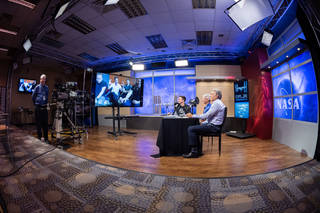
Host: Fascinating. Guys, what an awesome discussion. This was an absolute pleasure to have you here. Especially, Mark Vande Hei and Jim Picano. Thank you so much for coming on. And a very special thanks to you, Shinedown, for taking the time all the way from Norfolk, Virginia, for coming on today. This was a fascinating discussion. I really appreciate your time.
Eric Bass: Thank you all.
Zach Myers: Thank you for having us.
Dr. Jim Picano: Thank you very much.
Brent Smith: Thank you.
Host: Cool. Alright. That’ll do it for us. We are recording. This is obviously live, but we’re recording it. We’ll send it out as a podcast. You can find us, Houston We Have a Podcast, on NASA.gov. Thanks for tuning in. And while we sign off, I think I’m going to get a selfie of this moment. Because it is awesome. Thanks again, guys.
[ Music ]
Hey, thanks for sticking around. I really hope you enjoyed this live recording we did with Shinedown. It took a lot of work and a lot of people to have it all come together. And I’m very happy that it did. It was a very interesting topic. If you want to listen to this podcast or many others, go to NASA.gov/podcasts. Mark Vande Hei was on the space station from September 2017 to February 2018. You can look at all the things that he’s done and all the things that are going on right now aboard the International Space Station at NASA.gov/ISS or our many social medial pages on Facebook, Twitter, Instagram. Check out them all and use the #AskNASA on your favorite platform to submit an idea for the show. Make sure to mention it’s for Houston We Have a Podcast. This episode was recorded on May 17, 2019. Thanks to Alex Perryman, Norah Moran, Pat Ryan, Leah Cheshire, John Stoll, Greg Wiseman, Charles Clendaniel, Bill Stafford, Paula Vargas, Jim Wilson, and Jeannie Aquino. Special thanks to Morgan Townsend with Shinedown for helping us to pull all of this together. Thanks to Colonel Mark Vande Hei and Dr. Jim Picano for being our guests today. And thanks to Brent Smith, Eric Bass, Zach Myers, and Barry Kerch from Shinedown for taking the time out of their busy schedule to come and share their insights with the NASA community and the listeners of Houston We Have a Podcast. We’ll be back next week.







